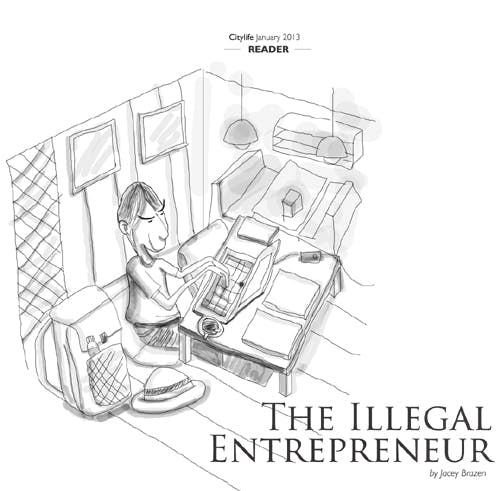
He stands in line at Suvarnabhumi airport immigration alongside the other excited, soiled and impatient visitors to the Land of Smiles. On his back, he carries a 35L backpack, and on his arm, a laptop bag with a MacBook Pro, several hard drives and some documents he’d been reading on the plane. He’s anxious. Not in a sweating, fidgeting, drug mule kind of way. But antsy, in the sort of foot-tapping, watch-checking style of a man with things to do, and (Skype) meetings to attend to.
The immigration officer looks through his passport, slowly fingering the worn pages full of visas from all manner of exotic locales. He gives him a withering look and stamps him into Thailand – on a 30-day tourist visa.
Smiling, he bids the official a cheery “sawasdee krup”, makes his way through the bustling terminal out into the midday sun, and hops into the first taxi cab that solicits him for business. The illegal entrepreneur has landed in Thailand. Within a few hours he will be sitting in a coffee shop, hunched over his laptop, analysing spreadsheets, cutting deals and checking to see how much money he made whilst in the big iron bird in the sky.
The old business model is broken, and no one cares to fix it
Ever since the release of the seminal book by Tim Ferriss, ‘The Four Hour Work Week’ in 2009, with its heady tag line “escape the 9-5, live anywhere, and join the new rich”, hordes of the young (and the young at heart) have begun to question the traditional life script: go to school, attend college, get a job, keep a job, plan for your pension, die. In fact, they’ve flipped it on its head.
The result: an ever-increasing community of location-independent solo entrepreneurs and freelancers who live and work from the road. They are e-commerce business owners, graphic designers, and writers, amongst other things. There’s also been a positive upturn in the number of telecommuters, due to smart employers who know that low overheads and happy employees are the key to long-term business success.
“I would classify myself as a virtual CEO, because there are two things that are important to me,” one of the entrepreneurs told me. “One is having a business and building a business, and finding ways to do that. Secondly, I want to do that without being tied to a location. When I go home people think I’ve just come back from a huge holiday, but I’m not on a holiday, I’m working. I might be switching locations, but I’m hustling even more when I’m travelling.”
In Chiang Mai, this virtual CEO is amongst his peers. The low cost of living and cheap, tasty food gives Thailand a high score when it comes to choosing countries to live and work from.
Legit, or not legit, that is the question!
The Ministry of Labour Affairs in Thailand has the following definitions and regulations:
1. ALIEN: means a natural person who is not of Thai nationality
2. WORK: means to engage in work by exerting energy or using knowledge whether or not in consideration of wages or other benefits
3. Aliens who live in the country or aliens who receive non-immigrant visas to enter the country can work after they apply for and receive a work permit
This is the problem facing not only the virtual CEO, but also scores of expats: in order to legally live and work in Thailand, you need a work permit. Now this is not exactly groundbreaking news. However, a quick look at the official Thai immigration website will give anyone with even the most casual interest in staying in Thailand longer than 30 days cold shivers.
There are numerous types of visas you can apply for if you want to stick around long-term. All require large amounts of documentation and often proof of finances. Even the standard volunteer visa which one might assume would be processed expediently – allowing short-stay visitors to earn some serious karma points whilst labouring for free – is not an easy gain.
Needless to say, the process of applying for any type of legitimate visa that would allow the virtual entrepreneur to work, rest and play in Thailand legally, is prohibitive.
And here’s why.
Firstly, the virtual CEO does not know how long they will stay in Thailand; three weeks, three months, a year maybe? An integral part of the virtual entrepreneur’s lifestyle is freedom, and that comes with a flexible itinerary. Applying for a working visa in advance for Thailand, or any other country they plan to visit, does not fit into that scheme – in fact, knowing in advance would pretty much require a crystal ball.
Immigration officer: “How long do you intend to stay in Thailand?”
Virtual entrepreneur: “Not sure, one, two months… I hear Costa Rica is fun in May…”
Secondly, the benefit of the time-consuming, complex and expensive application process is not entirely clear. What’s the real use of a piece of paper that says they are now allowed to open their laptop and work from their room? Furthermore, it’s likely that if the virtual entrepreneur keeps a low profile and doesn’t hire locals, the probabilities of them getting into a spot of bother – think big fat bribe, deportation or worst still, jail – are minimal.
Therefore, it’s no real surprise that the virtual entrepreneur does not consider the ‘legal option’ to be much of an option.
However, this low level risk does not mean virtual CEOs and other online workers living in Chiang Mai – and there are many – don’t consider the dangers of openly discussing what they do (for a living) in Thailand. Especially if they have been in Thailand longer than the average tourist would. It makes for some pretty odd conversations, filled with awkward silences, and usually ends with something like, “Oh, so you’re one of those.”
Danger in hi-so places
A common concern of virtual entrepreneurs about discussing ‘work’ with anyone outside of their likeminded circle is the threat of being reported, and the uneasiness that a well-connected, well-off Thai will shop them to the authorities.
“I could easily imagine some xenophobic Thai Hi-So finding out about [my virtual business] and thinking that something must be done about the situation,” said one entrepreneur, who has been working in and out of Thailand for the past few years.
The real fear for some is rarely that the cops are actively out searching coffee shops for latte drinking foreigners going about their daily business. Rather, that a local will get jealous and decide to take you down. Whether these fears are entering the territory of paranoia is up for debate.
“Basically the point is, don’t say more than you have to about it to the locals,” the entrepreneur continued. “The biggest thing that gets anyone in trouble over here is loose lips. Not because the officials really give a damn, but there is a ‘jealousy culture’ here. If a local gets jealous, they cause problems.”
The virtual CEOs usual code of conduct is to fly under the radar. No flashy cars, houses, or jewellery. Their most extravagant toys are their top of the line MacBook Pros, and even the noodle cart owner has one of those these days. Their business model is constructed in a way that minimal – if any – of their business assets are physical. They acquire their clients and sales online and the lion’s share of their financial transactions are conducted through the anonymity of the internet.
In other words, “thank God for PayPal.”
Of course, there is the moral argument that people working illegally in Thailand don’t pay taxes or contribute to the infrastructure of the country. But the illegal entrepreneur would counter-argue that, whilst here, they become regular patrons of coffee shops, eat at local street stalls and in expensive (often empty) restaurants – because unlike budget travellers, they can. They hire transport for weeks or months at a time, or take public transport multiple times per day; not to mention paying over the odds for short stay, comfortable accommodation and high speed internet.
The average virtual entrepreneur often spends in excess of 50,000 baht a month. It would not be remiss for them to claim that they actively contribute to the economy whilst taking nothing more from it than a gourmet coffee, a pad thai and a good time.
A change is coming, but not any time soon
Whilst the current, flawed work visa system is far too complicated to change overnight, there is much validity in the argument that the problem of tourists working illegally does not lie with the entrepreneurial trailblazers who take the technology and mobility of this generation and use it to create a lifestyle on their own terms. Rather, the problem thrives because of archaic and outdated ideas about entrepreneurship and self-employment, which leave governments slow to acknowledge and accept this new form of work. They fail to create the appropriate working visa schemes and reciprocal agreements that would allow this type of traveller to move and work freely, with the minimum of incumbency.
Of course, this is no easy task. But it is essential if governments want to profit from the flowing tide of travel and commerce they are powerless to stop.
Virtual CEOs are more than a passing trend
The future for the virtual CEO looks sundrenched; the tribe of online business owners running an empire from their keyboards is a growth industry. However, this does not mean that the location-independent entrepreneur can afford to become nonchalant, or showy. Discretion, anonymity and well-executed visa runs are the key to enjoying Thailand and its world-renowned hospitality – whilst running your business from your laptop.
“The best thing to do on a tourist visa is act like a tourist,” concluded another entrepreneur. “If you want to talk about your business, say that you are a business owner of whatever your business is and that you are on an extended holiday. If you do, however, get arrested, call a lawyer.”
